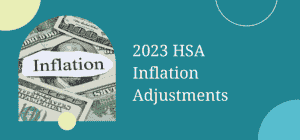Inflation Adjustments For 2023
The Internal Revenue Service (IRS) has announced dozens of inflation adjustments for 2023, including changes to long-term capital gains brackets. This could mean selling investments in 2022 may not affect your 2023 tax bill. Investments carried for more than a year can now have more taxable income before reaching the 15% or 20% brackets for investment earnings.

In a published article in CNBC, Tommy Lucas, a certified financial planner, said that this change could be “pretty significant.” With higher standard deductions and income thresholds for capital gains, “It’s more likely you will fall into the 0% bracket in 2023”, Lucas said. For 2023, you may qualify for the 0% long-term capital gains rate with taxable income of $44,625 or less for single filers and $89,250 or less for married couples filing jointly. This means that if you have taxable income below these thresholds, you can sell profitable assets without any tax consequences. For some investors, selling assets could be a chance to diversify amid market volatility.
READ ALSO: 2023 Inflation Relief Updates Per State Program
Whether taking gains or tax-loss harvesting, which uses losses to offset profits, you need to have a handle on your entire reportable picture, says Jim Guarino, in a published article in CNBC.
To make the most of this opportunity, consider your taxable income, including payouts, since you won’t have taxable gains in the 0% capital gains bracket. You should also estimate year-end payouts from mutual funds in taxable accounts, which may cause a surprise tax bill if not taken into account.
Overall, the inflation adjustments for 2023 could provide a significant tax-planning opportunity for investors. With higher standard deductions and income thresholds for capital gains, it is more likely you will fall into the 0% bracket in 2023. This means that you can sell profitable assets without any tax consequences, providing a chance to diversify amid market volatility. However, it is important to manage your entire reportable picture, including estimating year-end payouts from mutual funds in taxable accounts, to make the most of this opportunity.
READ ALSO: How To Apply For The $7,500 IRS Credit Under The Inflation Reduction Act





